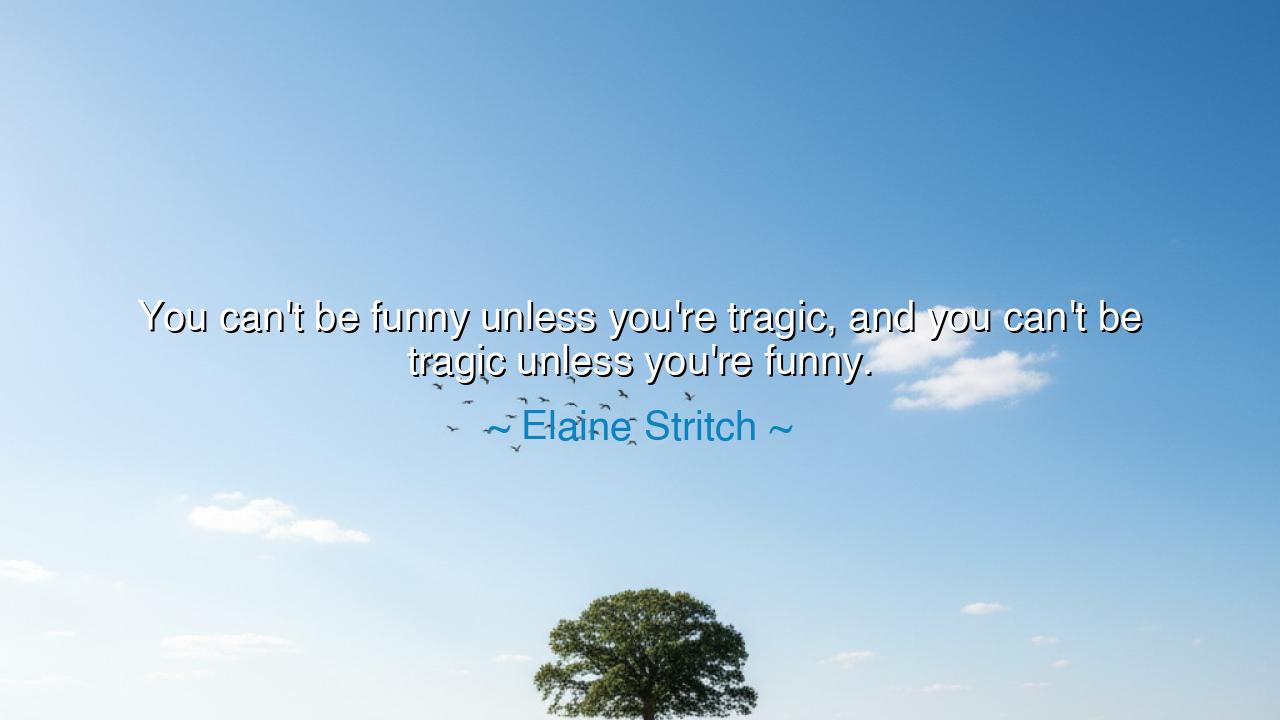
You can't be funny unless you're tragic, and you can't be tragic






The words of Elaine Stritch—“You can’t be funny unless you’re tragic, and you can’t be tragic unless you’re funny.”—are not merely a reflection on performance, but on the very essence of the human condition. In these few lines, she captures a truth as old as theatre itself: that comedy and tragedy are not opposites, but two faces of the same eternal truth. To be truly funny, one must have looked into the abyss of sorrow; and to be truly tragic, one must carry the flicker of laughter that endures even in despair. It is this intertwining—this delicate balance between grief and grace—that gives both art and life their power.
For what is humour, if not the ability to look upon pain and transform it into light? The great comedians, the true masters of mirth, are rarely untouched by suffering. Their laughter is not the shallow sound of ignorance—it is the deep, resonant echo of one who has survived. When Stritch says, “you can’t be funny unless you’re tragic,” she speaks of that sacred alchemy by which tears are transmuted into laughter. Comedy, in its purest form, is not the denial of pain but its transformation. It is the soul’s rebellion against despair, the way in which humanity says, “Yes, life wounds me, but I will laugh anyway.”
In the same breath, Stritch reminds us that tragedy without humour is hollow, heavy, and incomplete. The tragic hero who cannot laugh at himself becomes a monument, not a mirror. Even in the greatest sorrows, there is absurdity; even in the most solemn moments, the human heart trembles with irony. Hamlet, that prince of melancholy, was not only Shakespeare’s most tragic creation—he was also his most sardonic. His wit shines amid his suffering, for Shakespeare knew that to make the audience truly weep, one must first make them smile. Without laughter, sorrow crushes; but with it, sorrow transforms into wisdom.
We see this truth in the story of Charlie Chaplin, the silent prophet of laughter. Chaplin’s “Little Tramp” was both clown and martyr—stumbling, starving, and dreaming in a cruel world. He was funny, yes, but his humour was born of hunger and loneliness, of exile and loss. Chaplin once said, “Life is a tragedy when seen in close-up, but a comedy in long-shot.” This is the same vision that Stritch expresses: the recognition that humour and pain are twin perspectives on the same truth. The one who has suffered can laugh at life’s absurdity; the one who laughs sincerely teaches others how to endure.
The origin of Stritch’s insight lies in her own life—a life of dazzling success shadowed by struggle. On stage, she was bold, brilliant, and cuttingly funny. But behind that wit was vulnerability, a battle with fear, addiction, and loss. Her humour was not armor—it was revelation. It was the courage to expose the fracture in her soul and turn it into light for others. Like the great tragediennes of the ancient world, she understood that the audience does not seek perfection—they seek truth. And truth, as she knew, is always both funny and tragic, for it holds the full weight of what it means to be alive.
In her words, we find a lesson for the living: do not separate your laughter from your pain. Embrace them both, for they are the twin rhythms of your heart. When you suffer, allow yourself to find humour—not mockery, but perspective. When you laugh, remember the fragility of joy, and let it humble you. The wisest souls are those who can laugh through tears, who can look upon the chaos of the world and still find beauty in its brokenness.
So, my friends, let Stritch’s truth become your guide. Do not fear the tragic, for within it lies the root of your laughter. And do not fear the comic, for it carries the medicine of sorrow. To live fully is to walk the narrow bridge between the two—to fall and rise, to weep and to smile, to understand that each feeds the other. For in the grand theatre of existence, it is only when we hold both tragedy and humour in our hands that we begin to grasp the full measure of what it means to be human.
Thus, the teaching endures: be both the fool and the philosopher, the mourner and the jester. Laugh when you are broken, and cry when you are joyful. For life itself, in all its absurd glory, is both the greatest tragedy and the greatest comedy ever written—and it is yours to perform with all your heart.






AAdministratorAdministrator
Welcome, honored guests. Please leave a comment, we will respond soon